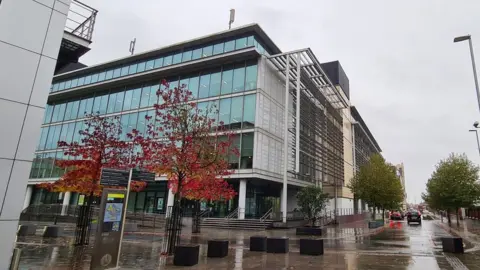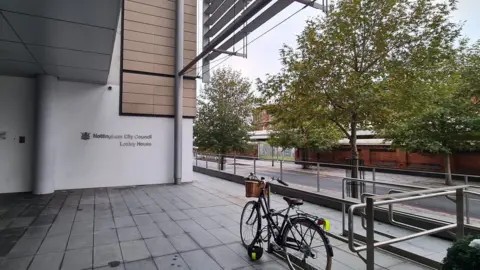Nottingham: Commissioners brought in to help run 'bankrupt' council
 LDRS
LDRSThe government has appointed commissioners to help run Nottingham City Council after the authority declared itself effectively bankrupt.
The Labour-run authority issued a section 114 notice on 29 November, amid an in-year budget gap of £23m.
Changes at the council have been overseen by a government-appointed board following the collapse of council firm Robin Hood Energy three years ago.
Now ministers have intervened further in a bid to speed up improvements.
In a statement, local government minister Simon Hoare said: "The Secretary of State is satisfied that Nottingham City Council is continuing to fail to comply with its Best Value Duty, and that the necessary improvements are still not being made quickly enough.
"I am today confirming that commissioners have been appointed to Nottingham City Council and new directions have been issued."
 LDRS
LDRSIt was confirmed three commissioners would be appointed - a lead commissioner, a commissioner for finance and a commissioner for transformation.
Mr Hoare said: "This team structure reflects the most pressing priorities at the council as highlighted in the Improvement and Assurance Board's latest reports, namely weaknesses in finance, transformation, along with an underlying culture of poor governance."
The commissioners have been appointed for two years, though this could be changed by the secretary of state.
They will work alongside the existing structure of the council, with all officers, elected officials and the leader, David Mellen, remaining in place.
Boasting extensive powers, the commissioners will oversee the full range of the council's improvement activities, including strategies to secure the medium and long-term financial sustainability of the council and plans to transform front-line services.
'Constructively and collaboratively'
In early 2021, an improvement and assurance board was appointed by the government to oversee and monitor the council's response to a report on its performance following the demise of Robin Hood Energy, the collapse of which is believed to have cost taxpayers about £38m.
The wrongful spending of nearly £16m from the Housing Revenue Account (HRA) - meant for the council's housing and its tenants - is also believed to have now cost £51m in repayments.
While acknowledging mistakes, the council also cited reduced government funding for local authorities, the cost of increased demand for children's and adults' social care and rising homelessness presentations as reasons for its financial woes.
As a result, it asked the government for "exceptional financial support" - a proposed combination of loans and special permission to raise money from council assets and spend it on day-to-day operational costs.
Major cutbacks have already been proposed, including the planned loss of 554 full-time equivalent posts, but the council's Labour executive refused to endorse these at a recent meeting.
The extensive budget savings package will go back before councillors at a meeting scheduled for 4 March.
Mr Mellen said: "Our preferred option was to continue to work with the Improvement and Assurance Board. We feel that significant progress was being made across the council.
"However, we are committed to working constructively and collaboratively with the commissioners to tackle Nottingham's current challenges."
The government said the commissioners would be asked to provide their first report within the next six months, with further reports roughly every six months.
Similar oversight has also been put in place at cash-strapped councils like Birmingham and Liverpool. As with these councils, the estimated £650,000 annual costs of the commissioners will be met by the authority itself.

Analysis
By Hugh Casswell, BBC Radio Nottingham political reporter
Taking the power to make decisions away from those who've been elected to make them shouldn't ever be taken lightly, and is the ultimate sign things have gone very, very wrong.
How much it will tangibly change in the short-term remains to be seen. Remember, sweeping cuts were already on the table.
But looking forward, it could mean future cuts are deeper still as those making the decisions now will be more concerned with the bottom line than anything else.
Doubtless you'll hear much of the argument you've heard before - one side blaming cuts from central government, the other blaming the council's own costly mistakes.
So do just bear in mind - both can be true at once.

Follow BBC East Midlands on Facebook, on X, or on Instagram. Send your story ideas to [email protected] or via WhatsApp on 0808 100 2210.


Are you affected by the issues raised in this story? Share your experiences by emailing [email protected].
Please include a contact number if you are willing to speak to a BBC journalist. You can also get in touch in the following ways:
- WhatsApp: +44 7756 165803
- Tweet: @BBC_HaveYourSay
- Upload pictures or video
- Please read our terms & conditions and privacy policy
If you are reading this page and can't see the form you will need to visit the mobile version of the BBC website to submit your question or comment or you can email us at [email protected]. Please include your name, age and location with any submission.
